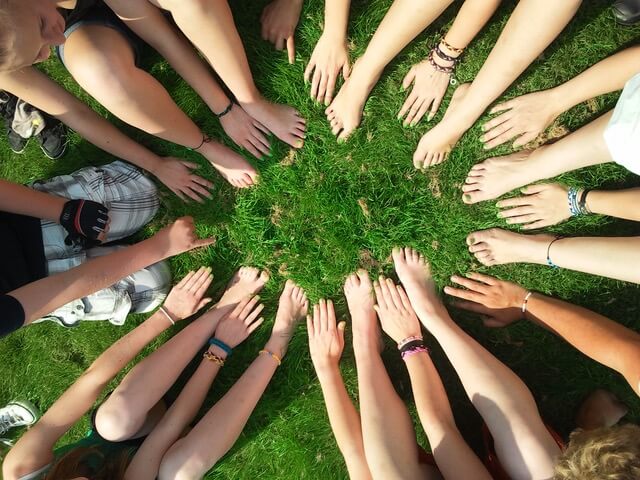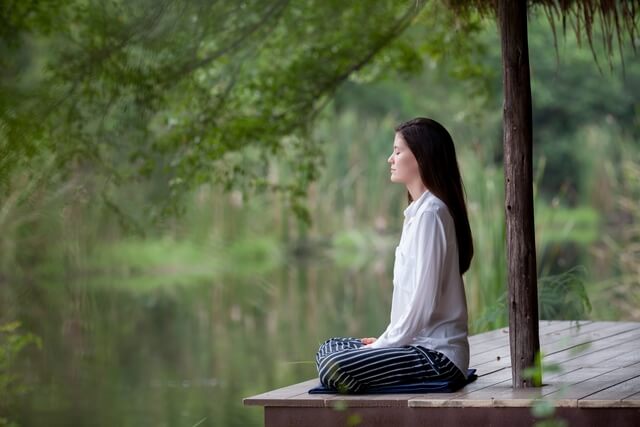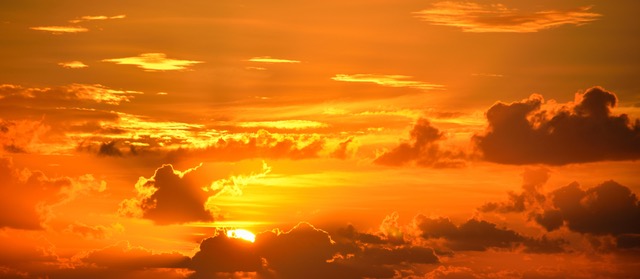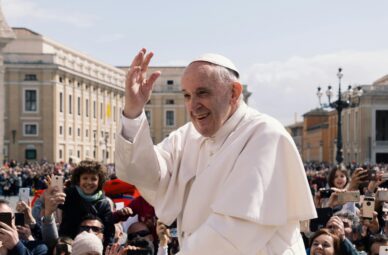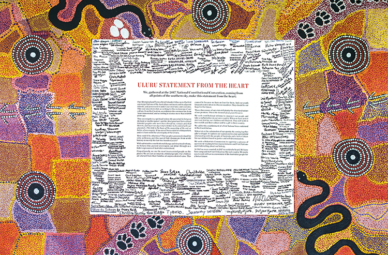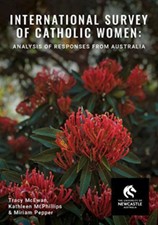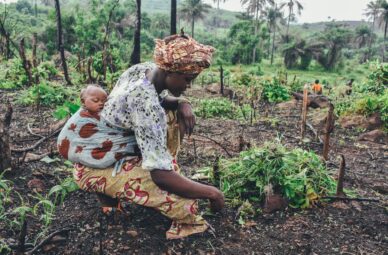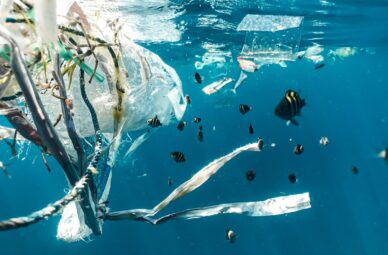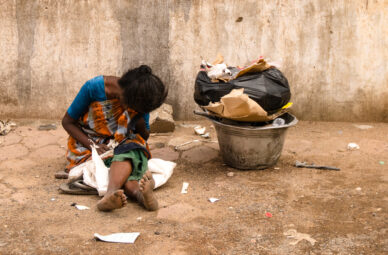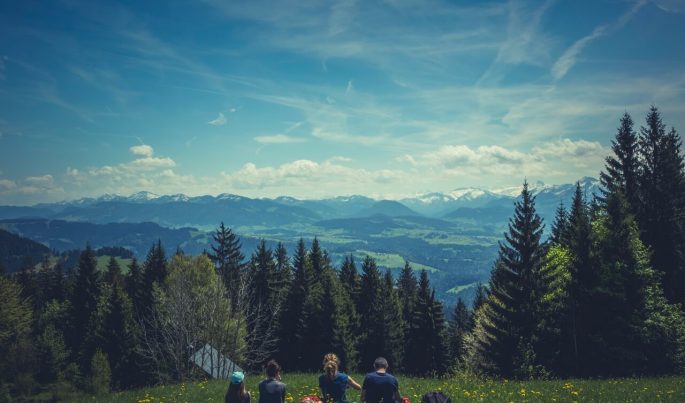
Eco-Spirituality for a New Age
June 15, 2017Welcome to the final in a five-part series written by Patricia Gemmell on the topic of Eco-Spirituality.
- Part 1 The Context for Ecological Theology and Spirituality
- Part 2 Reclaiming our heritage
- Part 3 God the Trinity
- Part 4 Women's voices
- Part 5 Eco-Spirituality
Part 5
In my previous articles, we looked at the context for contemporary ecological theology. We saw how the Universe Story gives us a new scientific framework for theological thinking as we try to grapple with the ecological crisis and articulate a new consciousness in its wake.
It is the hope of all who care for the earth that humanity will indeed accept its responsibility and turn the situation around. In view of the well-founded critique that Christianity must bear some of the blame for the way in which we human beings have exploited and devastated the earth, we looked at some of those treasures in our Christian heritage that would be most helpful in guiding a useful ecological way forward. We then looked at some of the ways that theologians are re-articulating the doctrine of God, and in my last article I focused on a number of women theologians, Sallie McFague in particular.
I suspect that very little of what I have said is either new or surprising to you. I think you are already very familiar with the themes I have dealt with. The problem is not one of knowledge. We already know what we need to know. The problem is that it is not enough to know with the mind, we have to know with the heart. And so we run into the perennial Christian problem: how can we experience conversion? How do we move our knowledge from the head to the heart? How do we embody this knowledge in our daily lives? This is the task of spirituality and the subject of this final article.
I would like to suggest that Pope Francis could be a very good guide for us here. His Chapter Six of Laudato Si’, “Ecological Education and Spirituality,” is well worth our serious study and reflection. It begins like this:
Many things have to change course, but it is we human beings above all who need to change. We lack an awareness of our common origin, of our mutual belonging, and of a future to be shared with everyone. This basic awareness would enable the development of new convictions, attitudes and forms of life. A great cultural, spiritual and educational challenge stands before us, and it will demand that we set out on the long path of renewal (202).
Let’s “unpack” this statement. We lack an awareness of our common origin, of our mutual belonging, and of a future to be shared with everyone. But awareness is not enough. It needs to lead to new convictions, attitudes and forms of life. How do we get there? The long path of renewal. There is no magic solution. We need to keep educating ourselves, we need to educate others, we need to change cultures of indifference around us, and most of all we need to change ourselves.
Francis does point the way in this chapter. He tells us we must change our lifestyle, resist consumerism, cultivate a disinterested concern for others, reject self-centredness and self-absorption, and assess the impact of everything we do on the world around us. We must overcome our individualism and develop new habits of living. Why is this so very hard? I don’t think it is just a lack of imagination, that we can’t imagine how we could realistically live our lives differently in 21st century Western society, though that is surely part of the problem. I think it is rather a question of the spirit. We need a new spiritual consciousness. Francis realises this when he tells us, “the ecological crisis is also a summons to profound interior conversion” (217). It is clear from the encyclical that for Francis it is the inner journey of transformation that must come first. If that happens, then all the rest will follow naturally. It is a case of “Seek first the kingdom, and all the rest will be given you.”
I would like to consider the ways in which we can seek to make this profound interior conversion, but before I do so, I would like to tell you what Francis thinks are the marks of such conversion. They include: a healthy relationship with creation; acknowledgement of our failings, leading to repentance and a desire to change; a spirit of gratitude and generous care; a loving awareness of our kinship with all creatures; awareness of our responsibility to the world; awareness that creation speaks to us of God; awareness that “Christ has taken unto himself this material world and now, risen, is intimately present to each being, surrounding it with his affection and penetrating it with his light;” an alternative understanding of the quality of life; “a prophetic and contemplative lifestyle, one capable of deep enjoyment free of the obsession of consumption”; the ability to be fully present to others; inner peacefulness; and finally, engagement with community to take action for change. How challenging is that?! Of course, this is just a mere summary of many beautiful passages in Chapter 6 of the encyclical, which, collectively, present us with a vision for a more authentic Christian life, in which care for the earth is considered essential.
I would like to share with you Elizabeth Johnson’s equally beautiful reflection on conversion. She says, “In sum, ecological conversion means falling in love with the Earth as an inherently valuable, living community in which we participate, and bending every effort to be creatively faithful to its well-being, in tune with the living God who brought it into being and cherishes it with unconditional love...Being converted to the Earth and its myriad inhabitants at this time of their distress is a moral imperative that transforms us toward greatheartedness, in resonance with the Love who made and empowers it all” (Johnson, 2014, 259).
I cannot tell you how much I have procrastinated in writing this article. Here is the great crux of the ecological crisis: we suspect that what is demanded of us is beyond our capabilities, because the sacrifices are too great. And thus, we feel powerless. And if we hear rightly, from all the voices of the eco-theologians, that we must become contemplative in our consciousness in order to change ourselves first so that we can then change the world, what does that mean in real and practical terms? I am by no means a mystical theologian and I am finding in myself a great resistance to speaking about this, and yet, I believe that it is absolutely crucial that we do the inner work. For Sallie McFague, the starting point for her saints was voluntary poverty, but this adoption of poverty was only possible because each one of her saints was deeply in love with Jesus of Nazareth and did the daily inner work of attention to that relationship. Daily inner work.
I am sure that many of us engage in daily spiritual practices. They are part and parcel of the Christian life. So is conversion. Denis Edwards says this about conversion: “It always appears before us again as an invitation and a grace offered in the new circumstances that we face” (Edwards 2006, 108). In an authentic Christian life conversion happens over and over again.
So as we learn about the Universe Story and the tragic story of what we humans have done to the earth, as we learn from the eco-theologians new insights into God, creation, and ourselves, we may well experience a calling to conversion. If we experience the desire to respond to this call, then it will inevitably challenge us to change our lives. That was certainly my experience.
I asked myself, “How does one develop a greater sense of wonder for the natural world? How does one learn to stop and stare, to be still and feel a deep kinship with all that is? How does one live a simpler life? How does one care for the planet, deeply and consistently?” There was no question of changing the spiritual disciplines I already had, but rather of taking my questions to them. But I felt, and still feel, the need to develop new ones, to address what I consider to be my own inadequate understanding of creation and to nurture in myself both a sense of wonder and a sense of communion with the natural world.
Those of us who are Catholics know that we tend to have a sacramental view of the world, that we look to find God in all things and all things in God, but nature got forgotten in the Catholic world view sometime after the Reformation and we have all been affected by that loss of memory. It is only since fairly recently that we are re-discovering that nature is God’s first revelation and worthy of our contemplation. I find these words of Bishop Kallistos Ware, an Orthodox theologian, very comforting: “the contemplation of God in nature, to affirm the Divine Presence in all created things around us, is within the scope of all of us…We are all of us contemplatives, and contemplation is possible whatever our way of life. No one is excluded. We can all affirm the world in God and God in the world” (Nataraja, 2011, 55).
I think it is worth thinking about conversion and contemplation in terms of spiritual disciplines, because it is not by any single action such as reading a book or going for a walk in the woods that we will be radically changed – even though those things may well be helpful. A spiritual discipline, whether it be a practice or a relationship or an experience, needs to be intentional, rooted in our desire for God and our longing to make a difference, and most importantly, it needs to be practised regularly and attentively. So if our desire is to come closer to God in the natural world because we know we are not very good at it, then we must be serious about it. This is what Sallie McFague has to say on the subject:
…A Christian nature praxis rests on the attitude towards nature that emerges from paying attention to it. It rests on respect for otherness and concern for its vulnerability. This sensibility does not develop or endure unless it is cultivated day by day [my italics]. As we must be open to, present to, God and neighbour, so also must we be to nature. We must be if we are to work, one day at a time over many years, for nature’s health and well-being (Cited in Edwards 2004, 129).
Day by day, she says. It makes sense, doesn’t it, that just as the body needs food to live, so does the spirit need its own nourishment every day. Our spirits, it seems to me, forget things so easily. So if I walk into my garden every day and give it my total attention for ten minutes to let it speak to me, it may slowly teach me something of what I need to know. In this respect, almost any activity can be taken up as a spiritual discipline, as long as the criteria are met.
What can we say of this contemplative consciousness that the eco-theologians speak of? Joan Chittister is characteristically poetic:
To be a contemplative, it is necessary to walk through nature softly, to be in tune with the rhythm of life, to learn from the cycles of time, to listen to the heartbeat of the universe, to love nature, to protect nature, and to discover in nature the presence and power of God. To be a contemplative it is necessary to grow a plant, love an animal, walk in the rain, and profess our consciousness of God in a lifetime of pulsating seasons (Illuminated Life: Monastic Wisdom for Seekers of Light, Orbis Books, New York, 2000, p.83 and p. 86).
Consider what Denis Edwards has to say:
An authentic ecological spirituality will involve a rediscovery of mysticism. In the way it is used here, the word mysticism refers to personal union with God in prayer. In this sense, all Christians are called to be mystics. Ecological mysticism, then, means finding the incomprehensible mystery of God in the boundless beauty of the natural world as well as in its strangeness and otherness. It will be a mysticism that involves an enduring, lifelong commitment to the good of Earth. It will be a mysticism that gives rise to action. The way of wisdom is not only a way of seeing, and not only the discovery of a new capacity of feeling for non-human creation, but both of these issuing forth in personal, political and ecclesial action (Edwards, 2012, 67).
Or you may prefer the words of Elizabeth Johnson on the subject:
Contemplation is a way of seeing that leads to communion… In contemplation the human spirit learns to see the presence of the divine in nature, and to recognize that the earth is a sacred place.
Through contemplation the religious spirit grows in the realization of how deeply humanity is embedded in the earth. We begin to know this experientially, to feel in the depths of our being that we are part of the living cosmos. Consequently, we recover a capacity for subjective communion with the earth…Consequently, reciprocity rather than rape marks our approach. Without the knowledge of contemplation, which is akin to prayer, prophetic action on behalf of the earth will in the long run fall short of the wisdom needed for its long-term cherishing (Johnson, 1993, 63-4).
Or, finally, you may like David Toolan’s succinct proposal:
Spiritual practices…are undertaken for the sake of registering in our bones the primordial rainbow covenant: All is blessed; nothing is to be lost (Toolan, 2001, 204).
But how do we reach this place of contemplative consciousness, where we feel it in our bones? I don’t think we can escape from the fact that however we get there, it is a lifelong journey that requires the sacrifice of our time and our undivided attention. We have to find for ourselves contemplative practices of prayer. I can’t see any other way. Diarmuid O’Murchu puts it like this: “We are now at a new evolutionary juncture when it may well be beneficial to reclaim the mystic within…We need to rediscover that commodity so rare today: the ability to be still, to be at home with creative solitude.” His conclusion is brief: “Meditation is a timely resource” (O’Murchu, 2002, 85, 180). So now I would like to talk about meditation as a resource for developing a new way of seeing and being and acting in the world.
Meditation is a practice of sustained attention which can potentially lead us into a state of contemplative prayer. Meditation is the contemplative practice that is most often recommended by eco-theologians, meditation that embraces stillness, silence and simplicity. Some of you may be familiar with the Centering Prayer of Thomas Keating. It is almost identical to what is known as Christian meditation as taught by John Main and as this is what I have been practising for eight and a half years now, I feel that I can talk about meditation from authentic, personal experience.
First of all, what is meditation? Go to the website of the World Community for Christian Meditation and you find this: “Meditation is a universal spiritual wisdom and a practice found at the core of all the great religious traditions, leading from the mind to the heart. It is a way of simplicity, silence and stillness. It can be practised by anyone, wherever you are on your life’s journey. It is only necessary to be clear about the practice and then to begin – and to keep on beginning”.
Why do we meditate? There are many answers to this question. I would say that we meditate in order to move our knowledge of God from the head to the heart, to take our attention off ourselves and onto the reality of the present moment, where God is always waiting for us. We meditate in order to just be and to be in the presence of God. We wait upon God, expecting and demanding nothing. It is a practice of patience and perseverance, in which we so often feel that our attention fails and wanders, but in which we strive to be faithful. Meditation is an exercise of the heart. Love is attention. Attention is love. In meditation we learn how to love by paying attention.
And the fruits of meditation? They are the fruits of the Spirit, who broods over our souls as we meditate and pours the love of God into our hearts. We learn to become humble, patient and faithful. I believe that the fruits of meditation are experienced in a unique way by each person. The Spirit meets us where we are and gently takes us where we need to go. But it will always be in the direction of greater detachment from our own agendas and greater love and concern for others. It will develop in us that loving eye that Sallie McFague speaks of, so that when we cast our eyes upon nature and give it our attention for the first time, we will learn to love and cherish it in all its otherness and integrity. Meditation is also a form of kenosis, of self-emptying and dispossession. It creates space for the Spirit. It is a way of poverty and simplicity that changes us to become who we really are.
How do we meditate? There is no better way to learn than by doing. So why not take a break from reading for a moment and give it a try? Here is what the World Community for Christian Meditation recommends:
Sit still with your back straight. Close your eyes lightly. Then interiorly, silently begin to recite a single word – a prayer word or mantra. We recommend the ancient Christian prayer-word "Maranatha". Say it as four equal syllables. Breathe normally and give your full attention to the word as you say it, silently, gently, faithfully and - above all - simply. The essence of meditation is simplicity. Stay with the same word during the whole meditation and in each meditation day to day. Don't visualise but listen to the word, as you say it. Let go of all thoughts (even good thoughts), images and other words. Don’t fight your distractions: let them go by saying your word faithfully, gently and attentively and returning to it as soon as you realise you have stopped saying or it or when your attention wanders. Meditate twice a day, morning and evening, for between 20 and 30 minutes. It may take a time to develop this discipline and the support of a tradition and community is always helpful.
I have found the practice of meditation a deeply transformative one and there is a long and rich tradition of such prayer in the Catholic Church. But sitting still twice a day and paying attention to a mantra is not for everyone. What IS fundamental, however, is paying attention, and doing it as a regular practice. I would like to suggest that paying attention to Jesus of Nazareth and paying attention to the meaning of the Eucharist are two other fruitful practices with the potential to develop in us a new way of seeing.
There is no better way of paying attention to Jesus, I think, than reading the gospels, and I would particularly recommend the practice of lectio divina which has a long history in the church. It started with Origen in the 2nd century, and was later developed and practised by Benedictine monks. It was recommended to Catholics in the Second Vatican Council’s constitution on Scripture, Verbum Dei.
Lectio divina is a slow, meditative reading of Scripture as the living Word of God, in which reading and meditating is accompanied by prayer and can lead to contemplation. It is a way of falling in love with Jesus and conforming ourselves more and more to the mind of Christ.
For Catholics, the Eucharist is the source and summit of the Christian life. Paying attention to the words of this ancient liturgy may nourish our ecological conversion. Now, my personal feeling, to be honest, is that the liturgical language of the Mass is deeply patriarchal, with theological baggage that needs to be confronted and addressed. I believe that Eucharistic theology is in need of much rethinking. However, I still go to Mass twice a week, because if I pay attention I am touched by the radical call of the gospel and nourished to go out and serve others as Jesus himself did, in creative love. Monika Hellwig wrote The Eucharist and the Hunger of the World in 1976 but her words still resonate powerfully today.
The Eucharistic gathering is of all places the most suitable place for the cry of the oppressed to be uttered and considered. Jesus crucified is above all representative of the marginated, despised and oppressed, of those who “don’t count” and are kept out of sight (socially invisible), of those who are outsiders and have no rights. It is not possible to be one with Jesus in the moment of his death and yet ignore the poor and suffering of this world. It is not possible to cross over in the sacrifice of the death of Jesus into the life of God, and to leave behind the poor and the oppressed of the world. To accept the bread of the Eucharist is to accept to be bread and sustenance for the poor of the world (Hellwig 1976, 78).
With that perspective in mind, and knowing that Pope Francis has called the earth itself “among the most abandoned and maltreated of our poor” (Laudato Si’, 2), we can bring our wounded earth to the altar table with us and learn to accept that we are called to sacrifice ourselves on her behalf. Hellwig pulls no punches. The Eucharist calls us to give our lives for others. If we are to be bread for the world, then we can expect to be eaten alive. The other side of the coin, of course, is that this is how we save our lives.
When theologians say the universe is cruciform, they mean that suffering and death are what lead to evolution and new life. Brian Swimme, reflecting on the fact that the Sun transforms 4 million tonnes of itself into light, every second, describes the action of the Sun as an action of self-sacrifice, and concludes
Human generosity is possible only because at the centre of the solar system a magnificent stellar generosity pours forth free energy day and night without stop and without complaint and without the slightest hesitation. This is the way of the universe. This is the way of life (Swimme 1994, 44).
It’s a beautiful image. I am not so sure that plants and animals can be thought generous when they give up their lives to feed others, but it is certainly true that life feeds upon the death of other life. The grain of wheat dies in the earth to produce more grain, which is ground into flour to make life-giving bread. Grapes are crushed to become wine. What does it mean when Jesus takes a loaf bread at his last meal, knowing he is going to be crucified, and says, “This is my body?” When he takes the cup and says “This is the cup of my blood?” At every consecration, I wrestle with the words and their meaning for the earth. Is Jesus identifying himself with the earth that brings forth fruit and the work of human hands that makes food for the eating? I think so. I grapple with what that might mean.
Sallie McFague – that wonderful woman – has no doubts about where the kenotic life of self-emptying leads us. In the last chapter of Blessed Are the Consumers, she proposes that we think of food as the most apt symbol of a contemporary ecological ethic, food “understood in the most inclusive way possible – as whatever is needed for us to be created, sustained, and to flourish, from the air we breathe and calories we consume to the food for thought that fuels our imaginations, our hopes, our joys” (McFague 2013, 210). Thus all our decisions, both large and small, would be guided by our desire to see that these needs are available to everyone in the world in a way that also takes care of the earth. But thinking of justice and sustainability in terms of the symbol of food brings us to the Eucharist, doesn’t it. “Give us this day our daily bread,” we pray to our Father. And Jesus gives himself to us in the form of food, his body broken for us, his blood poured out. As Jesus is food for us, so must we be food for others. We are gathered together at the start of Mass to remember who we are and what we are called to be, to be nourished and refreshed, and then we are sent forth to feed others.
At this point, I would like to pause. I said at the start that this was very difficult to write. It’s a very hard thing to share deeply of one’s personal spirituality and yet I found I could not talk authentically about spirituality without doing so. What is it that transforms us? We must not forget that our contemplative consciousness includes the action of our lives. By this, I mean much more than the politically engaged action that we take up on specific issues in our local and global communities, though this politically engaged action is immensely important. I mean the totality of our lives. Since Pope Francis has now openly called us to change our lifestyles in his latest encyclical, I would suggest that this is a good time to turn the spotlight on the way we live and reflect deeply on why we live the way we do, critique that lifestyle, and make the changes necessary to live a life much more in tune with the earth. This is not the work of a few days or weeks or even months, but something to engage us for the rest of our lives.
In many ways we are trapped by the society in which we live. The task of changing our lives can seem impossible. A good place to start may be to ask ourselves what constitutes a good life? Denis Edwards suggests we include “loving relationships, spending time with friends, meaningful work, contributing to community life, continual learning, music, an imaginative life, finding joy in birds, trees, deserts, forests and beaches, and our own personal and communal spiritual journeys” (Edwards 2012, 67). These are some of the needs we have for a flourishing life, though notice how food, clothing and shelter have been taken for granted in this list. In a world in which so many people are denied the basic rights of adequate food, clothing and shelter, we cannot lose sight of the fact that the Universe Story calls us to see creation as a community in which all are invited to flourish. Francis warns us that “a sense of deep communion with the rest of nature cannot be real if our hearts lack tenderness, compassion and concern for our fellow human beings”(91). He takes great care to teach us that justice for the poor and concern for nature are inextricably bound up together. Elizabeth Johnson sums it up nicely at the end of Ask the Beasts:
…commitment to ecological wholeness in partnership with a more just social order is the vocation which best corresponds to God’s own loving intent for our corner of creation. We all share the status of creaturehood; we are all kin in the evolving community of life now under siege; our vision must be one of flourishing for all (Johnson 2014, 285).
How do we turn our lives around? We must start with profound inner conversion, but at a certain point we can no longer do much as individuals. That is why Francis says that “the ecological conversion needed to bring about lasting change is also a community conversion” (219). As a community, we can educate and support one another, but we can also educate the world around us. I would like to give just one example. Stephanie Kaza, a Buddhist professor in Environmental Studies at the University of Vermont, suggests we start by considering the food we eat. She puts forward some questions we should ask ourselves about the food we eat:
- Where does the food come from?
- What do I actually need?
- What is my fair share?
- How do my choices impact on the food available to others?
- What or who was harmed in the production of the food?
"Whatever else we do, we all eat and, if we can do so mindfully, our meals can become a spiritual practice that will enrich our lives" (Kaza 2013).
These are questions that are best explored within a group, with unknown possibilities for individual and community action. They can be extended to just about anything we buy, and remember that Pope Francis has said, “every person ought to have the awareness that ‘purchasing is always a moral – and not simply an economic – act’” (World Peace Day Message, 2015). Community reflection can teach us how we can make our homes ecological, as well as our schools, churches and local businesses, but we also need community to build those regional, national and international networks that are so necessary in challenging and changing the corrupt power structures that destroy our planet and oppress the poor.
I have tried to give some answers to my opening questions: how can we experience conversion? How do we move our knowledge from the head to the heart? How do we embody this knowledge in our daily lives? There is no blueprint for how to do this and each of us must find our own path, but do not doubt that our Christian faith has abundant resources to help us and remember the importance of community, wherever you find it.
“The long path of renewal,” to use the words of Pope Francis, is about nothing less than changing the world. The ecological crisis is certainly a crisis of overwhelming proportions and it is tempting to retreat into our sense of powerlessness, and live in one form of denial or another. However, we know that crisis also means opportunity. The earth is crying out to us. The poor and the dispossessed of this world are crying out. The reality is that we all flourish or we all perish together. There has never been such a crucial time to change the world!
The vision of our Grail community has always been one of transformation, to build a universal society of justice, peace and love. It is not so very hard for us to extend that vision beyond humanity to the whole Earth community. The greater difficulty lies in imagining what a sustainable world of justice, peace and love might look like and how we might go about achieving it. What we must do is make a start. More than ever, we need the courage to care.
I would like to finish with the words of Elizabeth Johnson, who has been such a guiding light for me in writing this series of articles:
A flourishing humanity on a thriving planet rich in species in an evolving universe, all together filled with the glory of God: such is the vision that must guide us at this critical time of Earth’s distress, to practical and critical effect. Ignoring this view keeps people of faith and their churches locked into irrelevance while a terrible drama of life and death is being played out in the real world. By contrast, living the ecological vocation in the power of the Spirit sets us off on a great adventure of mind and heart, expanding the repertoire of our love (Johnson 2014, 286).
References
Edwards, Denis 2012, Jesus and the Natural World: Exploring a Christian Approach to Ecology, Garratt publishing, Mulgrave.
Edwards, Denis 2006, Ecology at the Heart of Faith: the Change of Heart that Leads to A New Way of Living on Earth, Orbis Books, Maryknoll, New York.
Edwards, Denis 2004, Breath of Life: A Theology of the Creator Spirit, Orbis Books, Maryknoll, New York.
Francis 2015, Laudato Si.
Johnson, Elizabeth A. 2014, Ask the Beasts: Darwin and the God of Love, Bloomsbury, London.
Johnson, Elizabeth A. 1993, Women, Earth, and Creator Spirit, Paulist Press, Mahwah.
Kaza Stephanie 2013, Mindfully Green, Finch Publishing, Sydney.
McFague, Sallie 2013, Blessed Are the Consumers: Climate Change and the Practice of Restraint, Fortress Press, Minneapolis.
O’Murchu, Diarmuid 2002, Evolutionary Faith: Rediscovering God in Our Great Story, Orbis Books, Maryknoll, New York.
Swimme, Brian & Berry, Thomas 1994, The Universe Story: From the Primordial Flaring Forth to the Ecozoic Era--A Celebration of the Unfolding of the Cosmos, HarperSanFrancisco, New York.

